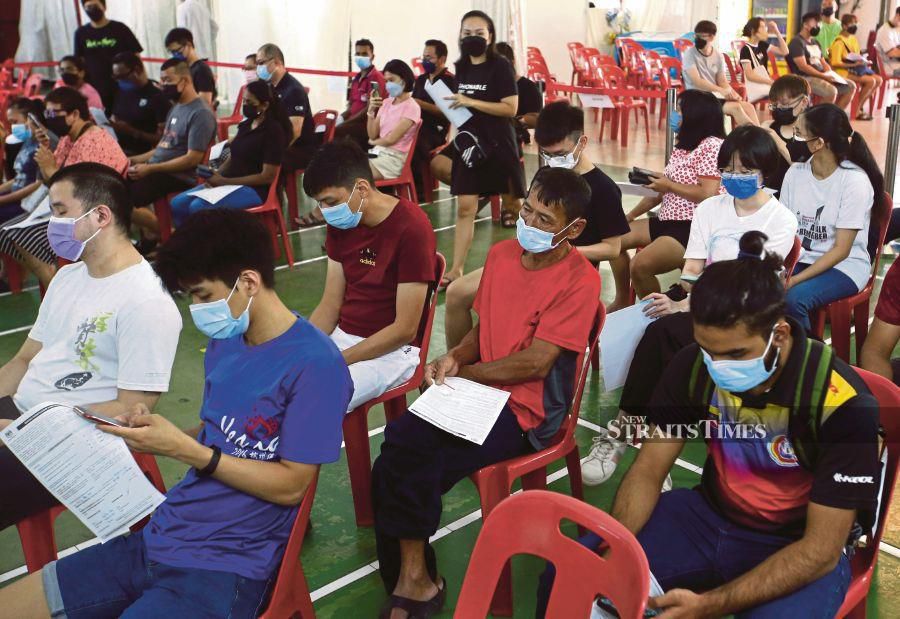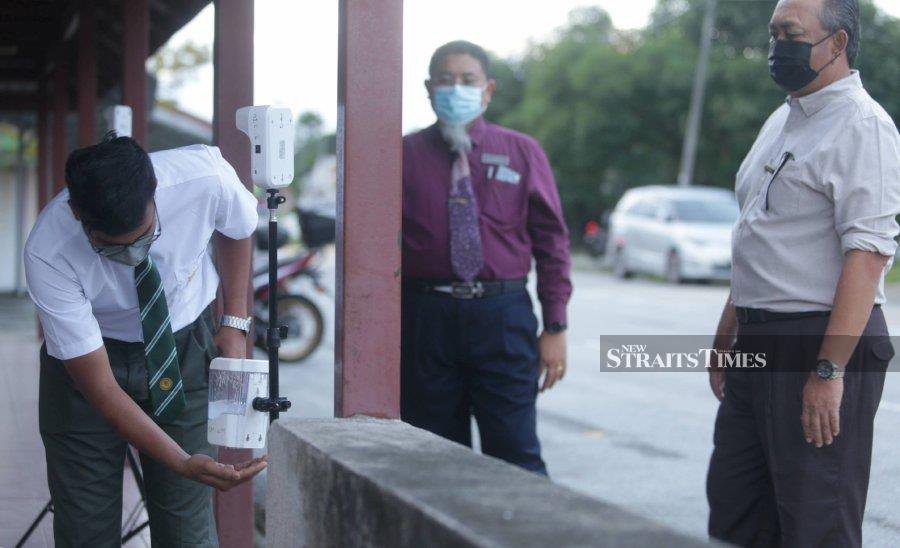EXPERT: COVID SURGE NO CAUSE FOR ALARM
https://www.nst.com.my/news/nation/2022/02/770190/expert-covid-surge-no-cause-alarm
By Audrey Dermawan - February 10, 2022 @ 9:01am
 People waiting to be vaccinated against Covid-19 at Dewan Ang Si Chong in Butterworth, Penang, yesterday. PIC BY DANIAL SAAD
People waiting to be vaccinated against Covid-19 at Dewan Ang Si Chong in Butterworth, Penang, yesterday. PIC BY DANIAL SAAD
GEORGE TOWN: The current surge in Covid-19 cases is not something to be alarmed about, a virologist said.
Universiti Sains Malaysia's Dr Kumitaa Theva Das said the country's active caseload increase of around 1,000 to 2,000 a day was expected as a similar trend was seen globally.
"There is an increase in cases as we are now dealing with the Omicron variant, which is highly transmissible, and spreads fast in a short time.
"However, the numbers we should pay attention to are those in Categories 3, 4 and 5, as those are the cases that will affect our healthcare system.
"For example, of the 13,944 cases recorded on Tuesday, only 73, or 0.52 per cent, were severe cases.
"So it is not something to be alarmed about," she told the New Straits Times.
Kumitaa, a geneticist with USM's Infectomics Cluster, Advanced Medical and Dental Institute, said those who received primary vaccine doses months ago would see their antibody levels decreasing now, putting them at risk of infection if they did not get a booster shot.
She said unvaccinated young children were also at risk, and made up 15 to 20 per cent of the new cases.
Although the Omicron variant differed from previous variants, Malaysia had the tools to tackle the surge, she said.
Kumitaa said among the measures people could take were getting vaccinated (and a booster if possible), getting tested if one was symptomatic or had been to a high-risk location, wearing a well-fitting face mask like the KN95, and, keeping vigilant even after being vaccinated.
"Existing public health measures can continue, including constant surveillance and related responses, such as testing, contact-tracing, isolation, quarantine and genetic sequencing.
 Dr. Kumitaa Theva Das
Dr. Kumitaa Theva Das
"Such information is crucial for early detection and will help us if new mitigation methods need to be implemented," she said.
Kumitaa said new variants would likely emerge as long as there were unvaccinated populations globally.
She said infections lasted longer in the unvaccinated, which made it easier for new virus mutations and variants to develop.
She said new variants could be detected fast with constant surveillance.
On views that even those vaccinated were infected with Covid-19, Kumitaa said everyone wanted to be healthy and safe, but due to information overload, one might not know what to believe.
"So it is crucial to convey the right message in a manner that people can understand why this (vaccination and booster) is necessary to keep them safe.
"To gain the public's trust in vaccinations and boosters, it is crucial to use the right platform, simple infographics or bite-sized videos, ensure that the information is available in different languages, and most importantly, use language that is easy to understand," she said.
On the increase in clusters from education institutions nationwide, she said a multi-pronged approach was needed to keep schools safe, including empowering teachers, staff and getting the support of the parent-teacher association to create a safe environment.
"Hand sanitisers should always be available around the school. Children must be made to understand the importance and practice of wearing a mask correctly and of physical distancing," she added.
On whether vaccinations should be mandatory, Kumitaa said now was not the time as there was a lot vaccine scepticism because of misinformation.
"Forcing someone to take the vaccine will be counter-productive, and may end up in more fake certificates being issued or vaccines being thrown away.
"It is more crucial to improve our information campaign. This means understanding where their beliefs stem from, being empathetic and making sure concerns from the grassroots are addressed.
"Once all proactive and sufficient efforts have been made and those who refused to get vaccinated put others at risk of serious harm, then it can be considered (to make it mandatory)."
Asked about another lockdown to lower daily infections, Kumitaa said the authorities had to balance between saving lives and livelihoods.
"We are in a different place now than in early 2020. Our high vaccination rate is our first line of defence. We can continue building on other public health efforts, including ensuring proper ventilation or employers being able to assess whether WFH (work from home) is a possibility.
 A Sijil Pelajaran Malaysia candidate sanitising his hands before entering his school for the oral and science laboratory examinations yesterday in Kuala Lumpur. PIC BY MOHAMAD SHAHRIL BADRI SAALI
A Sijil Pelajaran Malaysia candidate sanitising his hands before entering his school for the oral and science laboratory examinations yesterday in Kuala Lumpur. PIC BY MOHAMAD SHAHRIL BADRI SAALI
"There are many small steps that one can take (without relying on strict lockdowns).
"Instead of the daily new cases, we should focus on the hospitalisation figures."
On the National Recovery Council's (NRC) proposal to let in international travellers without quarantine, Kumitaa said there would come a time when borders reopened to allow things to go back to normal.
She said the NRC had yet to release the details of what this would entail, adding that the starting date (March 1) might be delayed until the Omicron wave was under control.
Kumitaa said it was too early to tell when Malaysia would transition into the endemic state.
Based on the "Transitioning from Pandemic to Endemic Covid-19 Safely and Sustainably" report that was tabled in Parliament, several indicators were suggested to determine the nation's transition into endemicity, including 1.5 severe cases per 100,000 population; five per cent hospital admissions in Categories 3, 4 and 5; 10 or fewer daily Covid-19 deaths; less than 20 per cent intensive care unit occupancy and more than 80 per cent of the population vaccinated.
"However, as we are dealing with a different variant now, these parameters may no longer hold true."
-Source from New Straits Times Online
- Created on .
- Hits: 521
